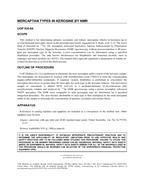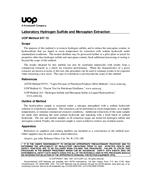This method is for determining trace concentrations of copper (Cu), iron (Fe), nickel (Ni), potassium (K), sodium (Na), and vanadium (V) by Atomic Absorption Spectrophotometry (AAS). It can be applied to petroleum products such as crude oils, gasolines, kerosenes, diesel fuels, and residues, or varied organic mixtures (including nitroanilines, amines, chlorobenzenes, phenols and other related materials) produced or used in chemical manufacturing. The range of quantitation is from 0.5 to 100 mg/kg (mass-ppm).
In addition to the elements listed above, aluminum (Al), calcium (Ca), cobalt (Co), chromium (Cr), magnesium (Mg), manganese (Mn), palladium (Pd), platinum (Pt), and zinc (Zn) may also be analyzed by AAS using the techniques described herein; but these elements have not been evaluated for sensitivity or repeatability. Also, lead (Pb), molybdenum (Mo), phosphorus (P), and tin (Sn) maybe analyzed by Graphite Furnace – Atomic Absorption Spectrophotometry (GF-AAS), which is outside the scope of this method.
Alternatively, the elements listed above may be analyzed by Inductively Coupled Plasma – Optical Emmission Spectrophotometry (ICP-OES). See UOP Method 389, “Trace Metals in Organics by Wet Ashing – ICP-OES,” for specific metals and their range of quantitation.
Product Details
- Published:
- 11/01/2009
- Number of Pages:
- 8
- File Size:
- 1 file , 100 KB


